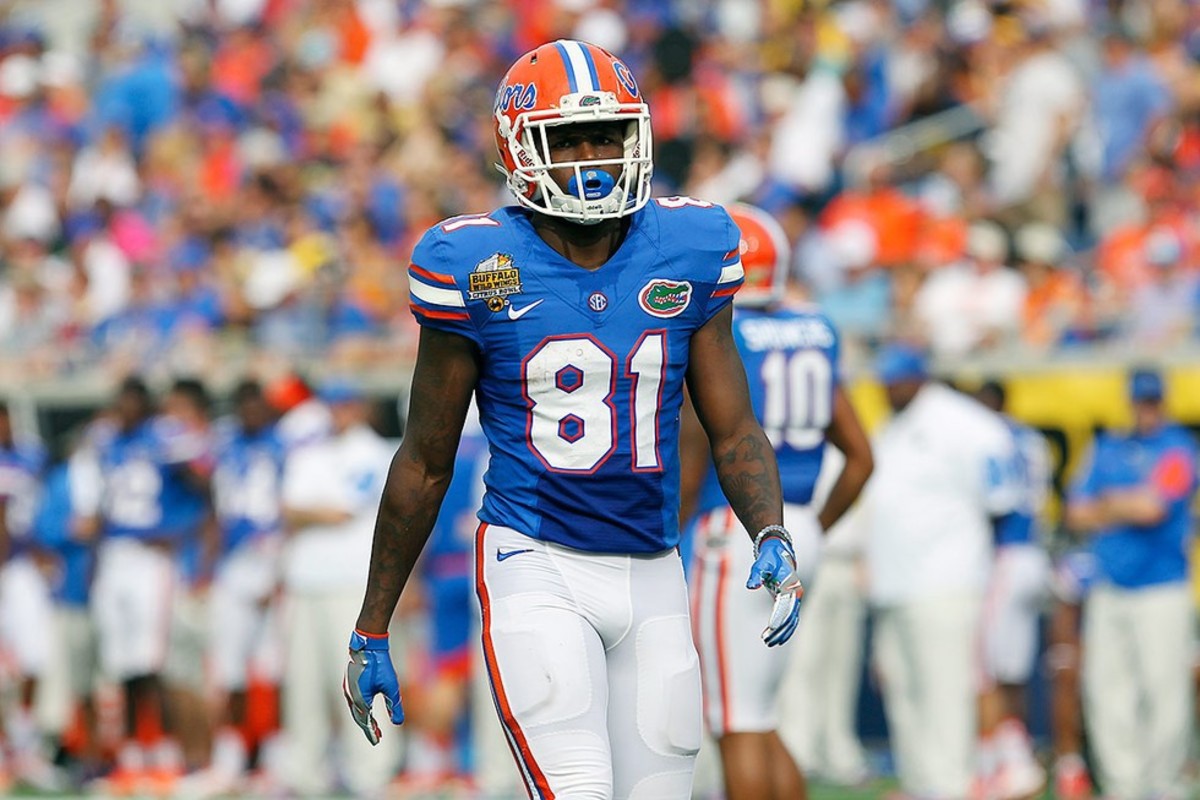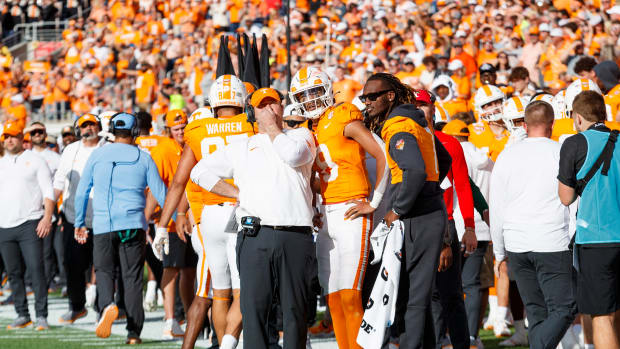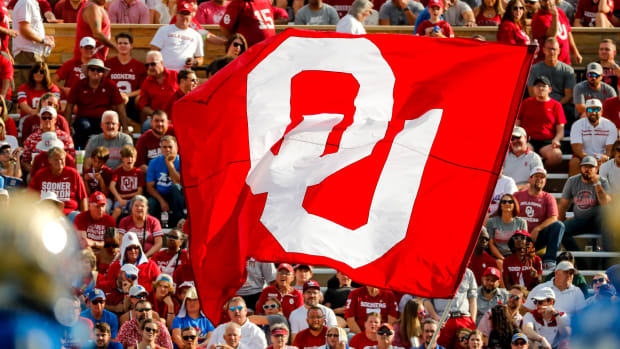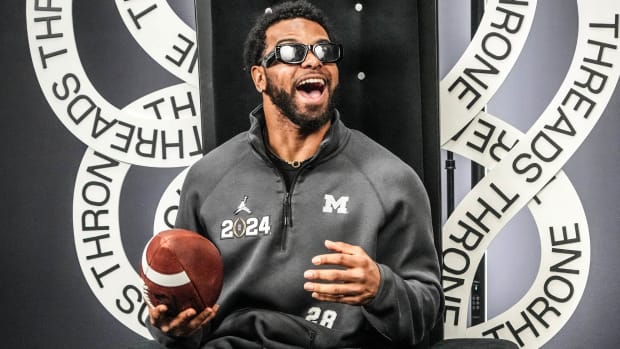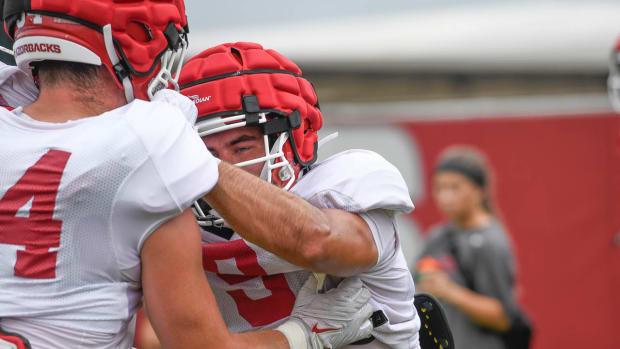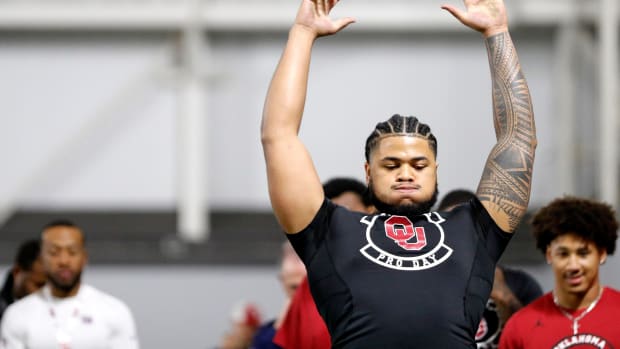Florida fumbles in making terrible decision in allowing booster to hear Antonio Callaway case; Punt, Pass & Pork
University of Florida officials could have avoided looking shady. They could have avoided a choice that made it appear to the outside world that the school cares more about winning football games than it cares about its female students. They could have avoided a decision that was patently unfair to an accuser, to the person she accused and to the person charged with dispensing justice.
The people in charge at Florida could have avoided all of this, but instead they either willfully or negligently chose a person who donates to Florida's athletic department—for the purpose of buying football and basketball tickets—to be the hearing officer in a student judicial affairs hearing involving Gators star receiver Antonio Callaway. Then, when an attorney for Callaway's accuser cited this as the reason the accuser would boycott the hearing, Florida officials—the university side, not the athletic department—then released a tone-deaf statement that proves they have no idea how much damage they could do to the people involved and to the university's reputation.
According to a letter from John Clune, the accuser's attorney, Callaway was accused of sexual assault by a female Florida student. His then-teammate, Treon Harris, was accused of attempted sexual assault. No police report is available, and the university—not the criminal justice system—has handled the case since the accusation was made. This is why information has been so scarce. Because the university has handled the case, the school has claimed all records are protected by the Family Educational Rights and Privacy Act.
Callaway and Harris were banned from campus from January until early June. Harris has since decided to transfer, and ESPN reported this was part of a plea agreement in the case. Callaway chose to fight the accusation in a hearing. He may be allowed to play football again, but thanks to the University of Florida, he'll be tarred even if he's innocent of the charge. Meanwhile, thanks to UF, his accuser had every reason to think the hearing was rigged. Also, a Jacksonville, Fla., attorney named Jake Schickel will have his objectivity questioned because UF officials weren't smart enough to realize a person who spends thousands a year to purchase Florida football tickets probably isn't the correct person to decide whether the Gators' best offensive player gets to continue as a student.
When Clune sent a letter protesting the choice of Schickel, Florida officials should have realized their mistake and found another person who doesn't donate to the athletic department. Instead, this is the statement University of Florida spokeswoman Janine Sykes released:
The University of Florida is prohibited to comment on the existence or substance of student disciplinary matters under state and federal law.
However, I can tell you that our student conduct process may be handled by a hearing officer, who could be a university employee or an outside professional, or by a committee of faculty and students.
Any hearing officer and all committee members are trained and vetted for their impartiality. A hearing officer or committee member would not be disqualified or lack objectivity simply because he or she had been a student athlete decades earlier or purchases athletic tickets as more than 90,000 people do each year.
This is defiantly dumb. Yes, 90,000 people do cram into Ben Hill Griffin Stadium during football season. That also means there are 20,110,000 Floridians who don't pay for Florida football tickets. (Schickel's donations stretch into the thousands each year because Florida requires a minimum donation to purchase season tickets.) Some of these people have law degrees. UF officials should have chosen one of them to avoid the appearance of impropriety because choosing Schickel wasn't fair to anyone involved—including Schickel—and only served to feed the assumption that schools will do anything to keep their best players on the field.
Chip Litherland
Was this a gambit by Clune to make an excuse for a weak case on his client's side? Possibly. Callaway's attorneys seem to think so. Amy Osteryoung, who partners with frequent Florida football player defender Huntley Johnson, released a statement to The Gainesville Sun saying as much. "We consider [Clune's] actions inappropriate and an attempt at intimidation," the statement said. "Since the complainant's attorney has chosen to go to the press in this matter, we assume that he will be releasing the hundreds of pages that made up the University of Florida's investigation. We assume that he will be releasing the sworn affidavits in this case. We assume that he will be releasing the complainant's text messages in the investigation. We assume he will be releasing the complainant's multitude of varying and conflicting stories."
The problem is that from a perception standpoint, none of the actual evidence matters now. Florida handed Clune a reason to protest the hearing on a silver platter. If the hearing officer doesn't donate to the athletic department, Clune's protest carries no weight. Now? It carries plenty, and it likely will help Clune's client in the public relations fight he'll wage if his client files a civil lawsuit against the university.
The hearing went ahead Friday as scheduled. A judgment will be rendered at a later date. Thanks to UF, any decision viewed as favorable to Callaway will damage the school's reputation. Even if Callaway did nothing wrong, it will be tough to find someone outside the Florida fan base who believes it. Only a verdict that goes against Callaway will satisfy the non-chomping public, and that certainly isn't a fair set of stakes, either.
Florida athletics officials, including athletic director Jeremy Foley, were furious with their university-side counterparts Friday for the way they handled this situation. If not for this, the athletic department could have explained any outcome with this: The university has handled this from the start. Here are all the steps that were taken. This was all by the book.
Now no one will believe that, even if it was handled exactly by the book. The school has placed the athletic department in a no-win situation. No matter what actually happened, this makes it appear as if the entire case was rigged to favor athletics. The Gators wind up the bad guys no matter the outcome.
It's no secret that I went to Florida. It's also no secret that I was once a walk-on tackling dummy for Florida's football team. Perhaps because of a little experience inside a major college football program and a lot of experience covering major college football programs, I've never been a "not at my school" person. Large state universities are multi-billion dollar operations with thousands of students and thousands of employees. They're all bound to get caught up in something unsavory. Every Florida graduate who turned up a nose at the way Florida State handled Jameis Winston's case should understand that after last week.
Your school probably isn't any better than any other school when it comes to handling these matters. My alma mater proved once again last week that it certainly isn't.
A random ranking
The Olympics are underway, which means for the next two weeks, we'll care deeply about track and gymnastics. We'll also care about competitions we neither know nor understand. Here are the top five Olympic sports to watch with no frame of reference.
1. Team handball
2. Trampoline
3. Sailing (windsurfing or dinghy)
4. Rhythmic gymnastics
5. Canoe slalom
First-and-10
1. The ongoing saga of defensive back Maurice Smith's attempt to transfer from Alabama to Georgia highlights the need for some common-sense changes to transfer rules that would take some—but not all—power away from the schools. Smith, who graduated from Alabama on Saturday, wants to transfer and play at Georgia. Alabama is hiding behind an SEC rule to block Smith, but if Alabama coach Nick Saban relented, Smith could receive a waiver to transfer to Georgia. Saban doesn't want to, probably because he'd rather not set a precedent that might lead to more of his players trying to follow former Alabama defensive coordinator Kirby Smart to Georgia.
Here's how it should work. A graduate who gives his old school ample notice should be allowed to play immediately anywhere he wants. An undergraduate should be allowed to receive a scholarship anywhere else—no blocking by his first school—but should have to sit a year unless the athletic director at his first school says it's O.K. that he plays immediately. That's it.
The Bulldogs' Smart said Saturday that he would let a Georgia graduate transfer anywhere, but that's easy to say when it's not his player trying to leave within the conference. After all, it was Smart who tried to block Georgia undergrad back A.J. Truman from receiving a scholarship at Miami. Truman didn't even want to go to Miami, but Smart slipped in the block to set the precedent that Georgia would make it difficult for players to transfer to play for former Bulldogs coach Mark Richt with the Hurricanes. Even though Turman and Smith's circumstances differed, each of their coaches was trying to keep them from following a former coach.
Richt, by the way, is one of the few coaches in America who doesn't block anyone from going anywhere.
2. Auburn coach Gus Malzahn booted starting tailback Jovon Robinson late last week. James Crepea of AL.com explains the reasons why. Sophomore Kerryon Johnson moves up to the first team. As for which quarterback will be handing the ball to Johnson, that still remains a mystery.
3. One of the reasons the Florida situation seems exceptionally tone deaf is that schools should have paid attention to the Baylor situation and examined all facets of how they handle these cases. Meanwhile, more keeps getting uncovered in Waco.
Last week, Baylor offensive lineman Rami Hammad was arrested on a stalking charge. Three days later, ESPN's Paula Lavigne reported that a different woman had reported to Baylor officials last fall that Hammad had sexually assaulted her. Hammad played the same week that he was accused of violating a protective order that had been granted to the woman.
4. Davis Webb, who graduated from Texas Tech and transferred to Cal this summer, will start for the Bears when they open the season Aug. 26 against Hawaii in Australia.
5. Interesting details keep emerging as Texas A&M and LSU continue fighting over whether the Aggies owe a $400,000 buyout for hiring away defensive coordinator John Chavis. The latest? That Chavis pretty much called the way LSU would attempt to fire head coach Les Miles last year.
6. Like Notre Dame last year, Florida State will have an all-access show on Showtime.
7. Notre Dame, meanwhile, has signed an all-access deal with Bleacher Report.
8. The announcement of that deal produced this excellent nugget of sarcasm. (Remember that Mike covers Texas.)
9. Finger also wrote a story about barbecue and the new Texas offense.
As you might imagine, that intrigued me quite a bit.
10. It's time…
What's eating Andy?
I would switch to public relations if every press release I got to write was like the doozy sent out last week by Karen Guss, the communications director for the city of Philadelphia's department of licenses and inspections. The subject? Dumpster pools.
"In view of the City's commitment to public health, safety and basic common sense, we will not issue permits for block party dumpster pools. And while you would think this decision would not require an explanation, three days of press requests have proven otherwise. So, Philly, here's why you shouldn't swim in a receptacle most often used for waste:
First and foremost, this could reduce the amount of water available should a fire break out in that neighborhood. So if you would like to have water available should a fire break out in your home, don't illegally tap a hydrant
There is also the potential loss of life by injury due to the hydrant water pushing a small child or even an adult into oncoming traffic.
Finally, remember that the pressure of the water coming out of the hydrant is so strong, and so powerful, that if opened too quickly or closed too quickly, it could deliver a jolt to the main of sufficient force that could break the main … and many blocks could lose water service until it is repaired.
We are not screwing around, Philly. The Streets Department will not issue any future block party permits to the 2400 block of Cedar, and officials have contacted the dumpster rental company regarding its failures to obtain the proper closure permits and to take mandatory measures to protect the street during placement of the dumpster.
In short, the City strongly recommends that residents opt for recreational options that are safer, more sanitary, and less likely to deplete the resources firefightersneed in an emergency."
Any document that includes the phrase "and while you would think this decision would not require an explanation" followed by an explanation is guaranteed to be an all-timer.
What's Andy eating?
Beginning Monday, I'm hitting the road for most of the next few months. I've spent the past two weeks at home, so I haven't had many culinary adventures. What does that mean? It's time for another installment of Chains That Should Go Nationwide.
Some of these are places I've already reviewed that have branched out from their first locations. Others are places I've come to love that I've never gotten around to reviewing properly.
Fuego falls onto the latter list. I'm shocked I haven't reviewed Fuego Tortilla Grill because I've eaten there at least once on every trip to College Station since 2012. It's a street taco joint across from the Texas A&M campus that stays open 24 hours (except apparently on Mondays these days), cooks its own rotisserie chickens for the tacos and generally is everything a restaurant should be within walking distance of a large state university.
Get the El Presidente (fried avocado, pulled chicken, bacon, jack cheese, pico de gallo and chipotle ranch), the Dr. Pepper Cowboy (brisket, grilled onions, Dr. Pepper barbecue sauce, chipotle cream corn and jack cheese) or have breakfast anytime with the Tesoro De Jordan (eggs, chorizo, grilled jalapeno, grilled onion, jack cheese, cheddar cheese, potatoes and fried tostadas).
Fuego has expanded to Waco (two locations) and San Marcos. That only leaves a few hundred more college towns that still need a Fuego.
I've written about a couple of biscuit-centric places over the years, and I'm disappointed that neither has marched forward to take over the globe. West Virginia-based Tudor's Biscuit World remains clustered in the Mountaineer State and its border mates with the exception of one location in Panama City, Fla., that presumably exists to serve spring breaking West Virginians. Meanwhile, Maple Street Biscuit Company has expanded out of its home of Jacksonville, Fla. Locations have popped in St. Augustine and Gainesville and as far away as Chattanooga, Tenn.
People love biscuits. They will eat biscuits at any hour of the day. For whatever reason, restaurateurs seem content to cede the biscuit market to Bojangles, Popeyes, Chick-fil-a and Hardees. Why? If Tudor's or Maple Street want, they can dominate.
Andy Staples
Speaking of competition for Chick-fil-a, there's room in the chicken sandwich market in most towns for another competitor, particularly one that surpasses Chick-fil-a's usually excellent product. Boxcar Betty's makes the best chicken sandwich I've ever eaten, but the only extension from the original in Charleston, S.C., is in the Charleston suburb of Summerville. Betty needs to branch out.
